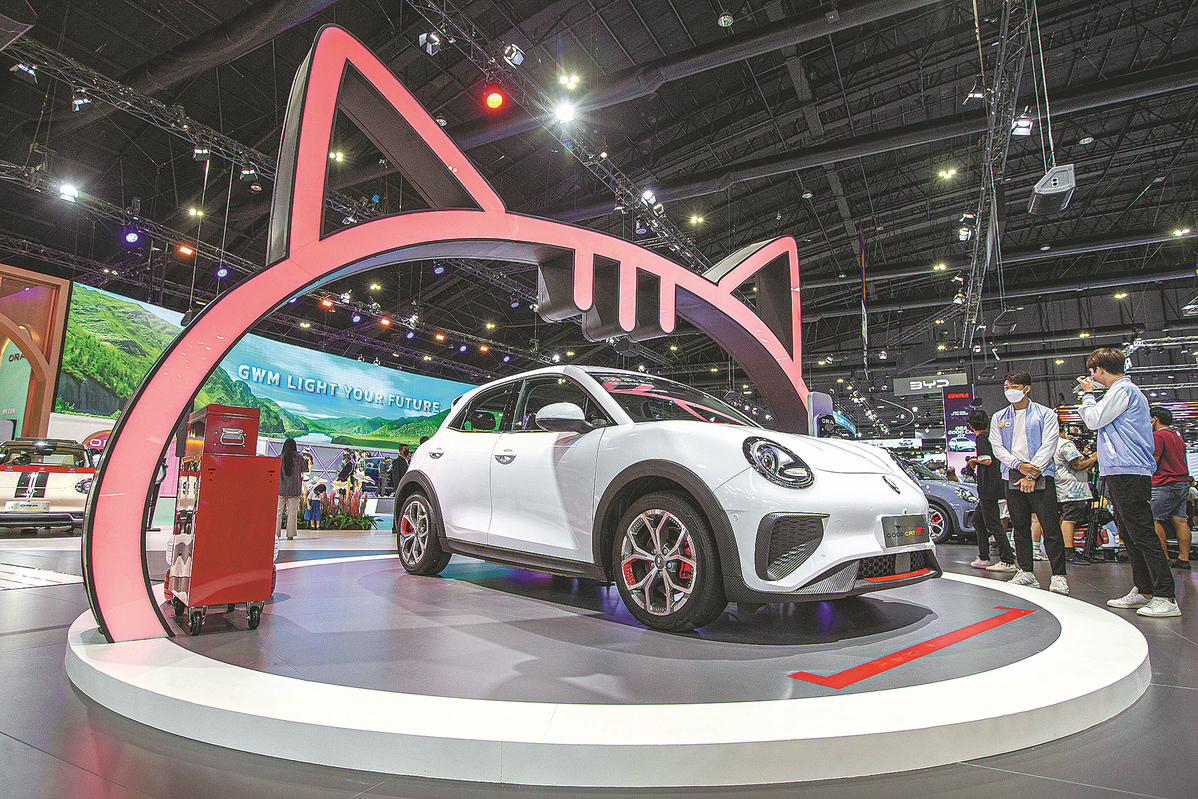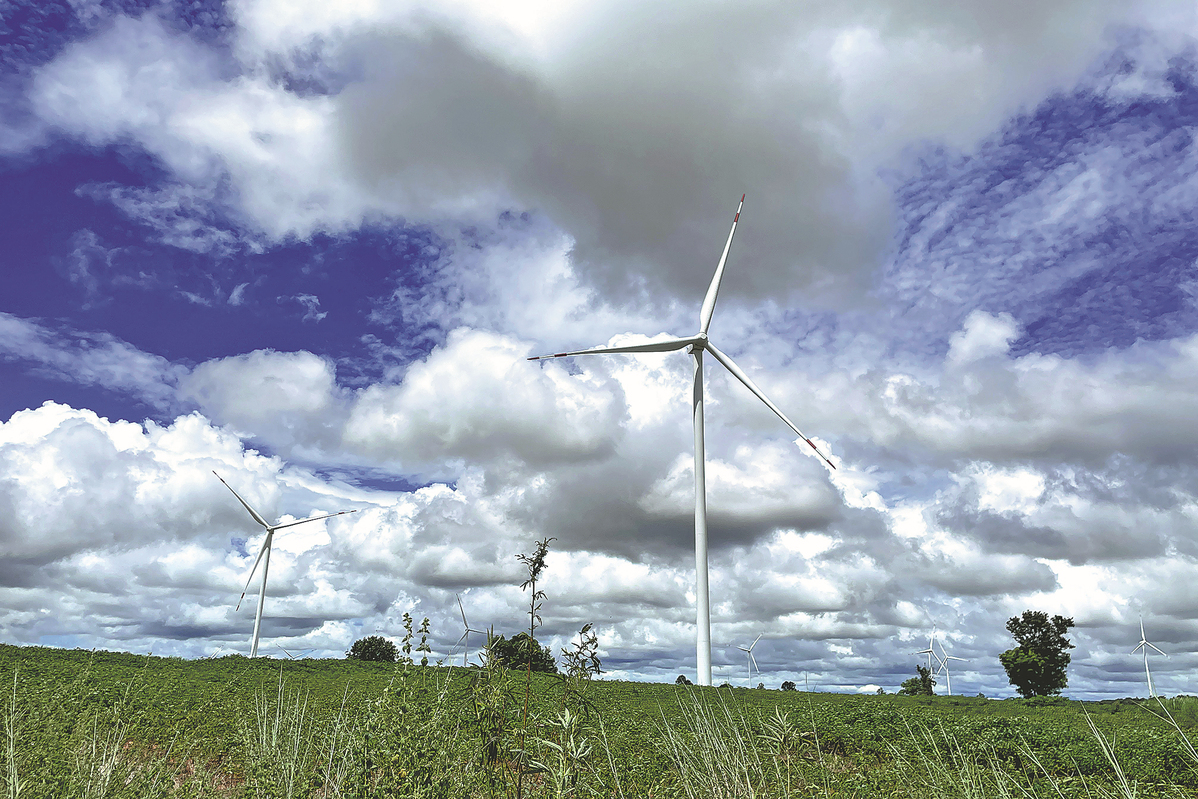
Visitors view an electric vehicle exhibited at the Thailand International Motor Expo 2022 in Bangkok on Dec 1. WANG TENG/XINHUA
Heading southeast for two hours by car from Thailand's capital Bangkok along the country's eastern coastline, several huge clusters of car plants can be seen nestled amid tropical forests, promising a green revolution for the auto industry in Thailand and Southeast Asia, through the embrace of electric vehicles, or EVs.
As Asia's fourth-largest automobile assembly and export hub for carmakers, Thailand has enhanced its attractiveness as an EV production base by offering incentives to set up such plants, with Chinese brands winning growing recognition.
According to the Thailand Automotive Institute and the government's Department of Land Transport, sales of pure electric vehicles in Thailand reached 13,454 units last year, up a whopping 600 percent compared to the 2021 level.
Behind the dramatic surge in the country's EV industry, Chinese brands are undoubtedly the most visible force, said Wichai Kinchong Choi, senior vice-president at Kasikornbank, a leading Thai bank.
"With its innovative and advanced technology, Chinese EV brands are now making a turning point in the country's auto market that used to be monopolized for decades by Japan and other Western brands. Moreover, they have helped to improve Thai employment," he said.
At Great Wall Motor's new energy vehicles, or NEV, plant in Thailand's Rayong Province, the Chinese company's first overseas NEV production factory, a total of 11,616 vehicles were made last year, adding to the total output of 15,320 vehicles delivered since the brand's launch in Thailand in 2021.
Production in the plant is conducted by about 1,000 workers. Of these, about 95 percent are Thai employees, according to Li Guangyu, Great Wall Motor's ASEAN regional vice-president of manufacturing.
"With the continuous improvement in both the sales network and product lineup, we aim to achieve 15,000 or 18,000 deliveries in the Thai market this year. In the near future, our plant is expected to have all workers from Thailand except for a few Chinese for the management team," he added.

Wind turbines supplied by China's Goldwind, as seen in this picture in Chaiyaphum on Oct 4, help to generate clean energy. SONG YU/XINHUA
More chance
Choochat Phonphoem, 42, who has worked in Great Wall Motor's Rayong plant for nearly two years, said he earns a basic monthly income of nearly 18,000 baht ($534) with a bonus based on production performance. "The wage is higher than in my previous (job) in another car plant and has been stable even during the COVID-19 pandemic," he said.
The job also offers him more chances to learn Mandarin and Chinese culture. Now he can speak some basic sentences in Chinese, such as a brief self-introduction. In the canteen, he said workers can have options for traditional Chinese cuisine, including dishes like Kung Pao Chicken and scallion.
As China and Thailand have had more collaborations and exchanges in recent years amid China's Belt and Road Initiative, Choochat said people from the two countries understand each other better.
"My 12-year-old daughter's school also offers Mandarin classes. I believe China and Thailand will see closer partnerships in the future," he said, adding that Shanghai is among the top choices on his travel wish list as he is impressed by the city's mix of historical sites and modern vibes, as seen on social media.
Bridging the differences is a core task for Chinese companies going overseas. And it has been the same case with Great Wall Motor in Thailand. Despite geographical proximity and cultural similarity, Thailand still has its uniqueness in terms of customer preferences. An interesting example is their completely different attitudes in regard to the EVs' "smartness".
"Chinese consumers are fond of those cool AI-supported functions, which communicate with drivers frequently, such as providing safety reminders. But for many Thai consumers, they are more accustomed to a simple relationship between car and driver, with less interaction," said Zhang Zhen, director of brand and communications at Great Wall Motor, or GWM.
"The smart car sensor was the complaint we received most when GWM entered the Thailand market at an early stage. Many customers said it's too annoying for the sensor to give 'beep beep beep' reminders all the time when some objects are too close. But you know in Bangkok, it is inevitable, because motorcycles are everywhere," he said.
Even so, great outcomes were witnessed after prompt adjustments. Last year, GWM sold 11,616 vehicles in Thailand, more than triple the previous year's tally, with a market share of 1.4 percent.

A worker on the production line of Great Wall Motor's new energy plant in Rayong Province, Thailand, in April. YANG WANLI/CHINA DAILY
Future trends
"As Chinese EV brands joined the Thai government's subsidy measures, it is not only good news for car buyers who will have more choices, but also for the Thai automotive industry during the transition period to catch up with future trends toward sustainable development," said Li, the ASEAN regional vice-president at GWM.
In the Thai government's 20-year strategy, known as Thai 4.0, Thailand aims to promote the country's innovations on the world stage and transform its economy by using technology and innovation with an environment-friendly policy.
One target of the strategy is to transform Thailand into an EV hub, with electric vehicles making up 30 percent of the total number of automobiles produced by 2030 and phasing out sales of combustion-engine vehicles completely by 2035.
At a recent news conference, Thai government spokesperson Anucha Burapachaisri revealed that EV registrations in Thailand hit 8,522 in March, almost double the January figure of 4,543. He said the promotion of EVs is the country's important stepping stone toward a low-carbon society.
"Thailand 4.0 holds the same vision as China's modernization path, which emphasizes green and sustainable development. Given that shared willingness, China's EV companies can serve as an important driving force to the Thailand 4.0 strategy," said Li.
As the EV industry in the Chinese market has been developed for years, he said China has unique advantages and can share its experiences and innovative technologies for boosting the region's green development.
Li said exchanges and mutual understanding between China and the rest of the world will be enhanced as more Chinese enterprises go overseas, thanks to the BRI.
"This brings a great chance for Chinese people to know the world better. The world, in return, will have a true, vivid portrait of Chinese people."